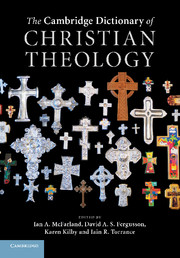B
Published online by Cambridge University Press: 05 June 2012
Summary
Balthasar, Hans Urs von Among the most influential Catholic theologians of the twentieth century, Hans Urs von Balthasar (1905–88) gave himself to the work of spiritual direction, translation, and publishing, founding and leading a religious community, and he produced a massive theological literature that, in many ways, is only explicable as the fruit of his spiritual life. His writings range from important studies of Origen, Gregory of Nyssa (see Cappadocian Fathers), and Maximus the Confessor, to analyses of the spiritual life as it unfolds in many different contexts (especially as it is revealed in the lives of the saints and mystical writers), to his great fifteen-volume trilogy in which theology unfolds according to three transcendentals of the beautiful (The Glory of the Lord), the good (Theo-Drama), and the true (Theo-Logic).
In each of these categories (in which he consciously inverts the order of Kant's critiques), Balthasar shows how the patterns of worldly being might become translucent to the consummate truth of their existence. A literary scholar by training, Balthasar often employed genealogies of cultural structures in order to portray their evolution and their transformation within the Gospel. Thus a central motif of his theology is the impression that the divine makes within the world, calling forth from the creatures a variety of finite expressions and echoes in which they are most themselves when they are also epiphanic of divine glory.
- Type
- Chapter
- Information
- The Cambridge Dictionary of Christian Theology , pp. 51 - 76Publisher: Cambridge University PressPrint publication year: 2011



